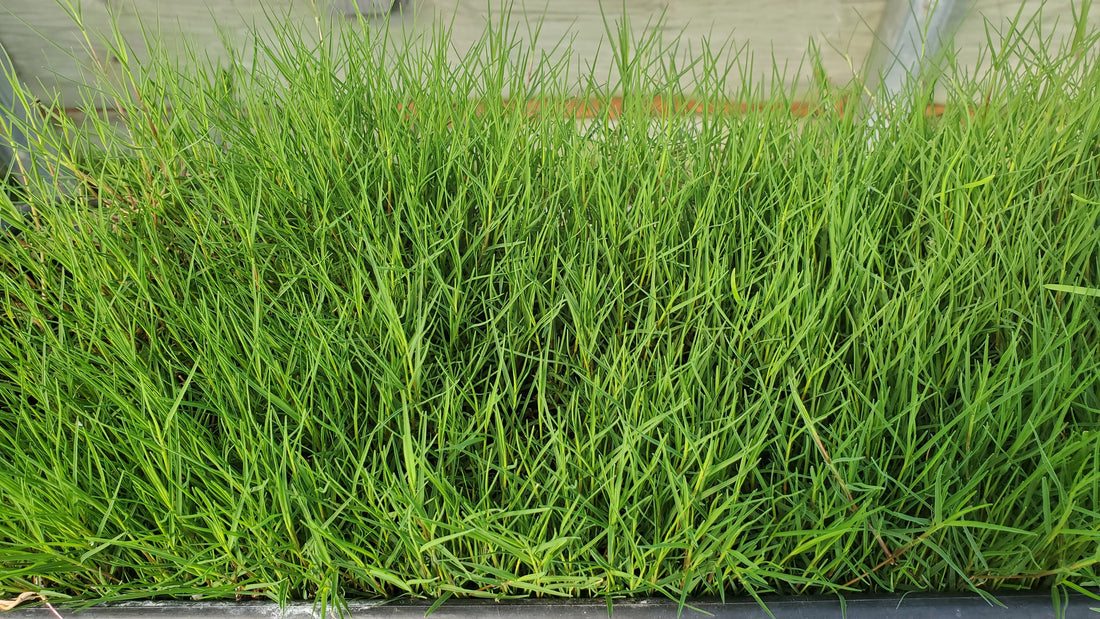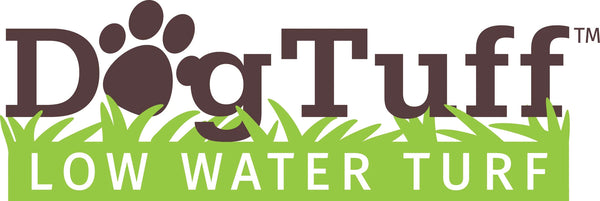
DOG TUFF™ Grass vs Bluegrass and Artificial Turf for Dogs
Share
Many people are deciding to make the switch from their thirsty bluegrass lawn to something else. AstroTurf has been getting all the headlines as a great solution, but how does it compare?
Pet owners face unique challenges when trying to maintain a healthy lawn. Dog urine and constant play can create dead spots and wear down regular grass, but DOG TUFF™ grass is specifically suited to resist these problems. This grass is perfect for homeowners who want a lush, green lawn that doesn’t require the upkeep or costs associated with AstroTurf, other artificial turf options or bluegrass.
Key Benefits:
- Urine and salt resistant: High nitrogen, coming from dog urine, can quickly destroy regular lawns, but DOG TUFF™ grass can handle this better than bluegrass or fescues. High salts from deicing roads can kill many grasses, but DOG TUFF™ grass has a higher tolerance making it better for the dreaded "Hellstrips".
- Durability: DOG TUFF™ grass is much more durable than bluegrass or native grasses which can turn to mud or create trails that wont go away.
- Low Maintenance: Unlike AstroTurf or synthetic grass, which can demand frequent cleaning and costly products to manage pet odors, DOG TUFF™ grass only requires minimal watering, mowing and fertilizing.
For pet owners, the ability to maintain a healthy lawn with minimal upkeep makes DOG TUFF™ grass a far superior choice to both traditional lawns and synthetic grass solutions.
Why DOG TUFF™ Grass is Better Than Synthetic Grass, AstroTurf and Bluegrass
Cost Benefits:
- Initial Costs: The cost of installing AstroTurf or synthetic grass can be significant, ranging from $15 to $19 a square foot, requiring specialized labor and expensive materials. In contrast, DOG TUFF™ grass is much more affordable to plant and can be installed by homeowners or normal landscaping companies.
- Maintenance Costs: Although AstroTurf doesn’t require mowing, it does require cleaning, deodorizing, and repairs over time. DOG TUFF™ grass, on the other hand, is self-regenerating, reducing long-term maintenance costs. Bluegrass is well know to cost more water and fertilizer which add up over time.
- Maintenance Time: Mowing a bluegrass lawn once a week is such a hassle! Switch to DOG TUFF™ grass to mow every 3 weeks or less.
Comfort and Safety:
- Odor Management: Pet urine can cause lingering odors on synthetic grass or AstroTurf, requiring special cleaners. DOG TUFF™ grass absorbs moisture and doesn’t trap smells, making it a more pleasant option for pet owners.
- Fine Texture: synthetic grass may look nice from far away, but upon placing your hands or feet on it, you will instantly feel the plastic fibers. DOG TUFF™ grass on the other hand, is incredibly fine in texture, making it a wonderful experience for children's barefeet and dog paws. Bluegrass can get really tall and scratchy, even causing skin irritation compared to the thin blades of this warm season grass. People often comment on how soft this grass feels!
- Turf burn: Anyone who has played sports on AstroTurf can tell you first hand how much it hurts to slide or roll around on the plastic fibers. DOG TUFF™ grass is the natural alternative that supports your feet and doesn’t tear your skin if you play and roll around on it.
Eco-Friendly Landscaping with DOG TUFF™ Grass
In today’s world, more homeowners are looking for ways to reduce their environmental impact, and DOG TUFF™ grass fits perfectly into this eco-conscious mindset. While synthetic grass may reduce water usage, it’s not as environmentally friendly as it seems. Synthetic turf is often made from petroleum-based products which become microplastics and doesn’t contribute to local ecosystems.
Environmental Benefits of DOG TUFF™ grass:
- Water Conservation: Did you know that, at 163,000 sq km (an area the size of Wisconsin), lawns are the largest irrigated crop in the U.S.? DOG TUFF™ grass needs up to 80% less water than traditional lawns, making it ideal for drought-prone areas, so we can save the water for growing food or other better uses. Water conservation is such a big issue, states like Colorado are looking to limit or ban new bluegrass lawns. And even though it is not alive, AstroTurf still requires regular water to flush and clean off dog urine that just pools up, a fact often overlooked by new owners.
- Urban Heat Islands: While synthetic grass may save water, it lacks the cooling benefits of real grass, which can increase the heat island effect in urban areas. Even rock mulch, another drought tolerant option, helps to heat up our cities. DOG TUFF™ grass and other xeric plants are a better option to help cool our cities.
- Native Grasses: Although a better choice for the environment, native grasses can turn to mud in areas with heavy traffic, and they can't handle dog urine very well. This is why we advocate using them in areas on the margins that don’t need to support running dogs or kids playing everyday.
- Reduced Chemical Use: Fertilizers are having a huge impact on our water supply, with many communities struggling to keep nitrites out of their drinking water and bluegrass lawns require significantly more than DOG TUFF™ grass. Even synthetic turf can be damaged and stained by dog urine or other activities which would then require chemicals, such as aerosol refrigerants, ammonia mixtures or mineral spirits to keep clean.
- Biodegradable: Over time, synthetic grass can break down, leading to microplastics entering the environment. In fact, Europe has already outlawed parts of artificial turf, California just passed legislation moving to ban it, and even Los Angeles is in the process of banning it at the local level.
- Waste: Once AstroTurf reaches the end of its life, it will need to be torn up and thrown into a landfill. Even if they eventually find a way to recycle it, the energy cost and CO2 emissions to do so will be a great cost to the environment. Microplastics from artifical turf are already a major concern for aquatic ecosystems.
- Air Pollution: Small engines can be extremely inefficient, as such, mowers create much more air pollution that you might think. Luckily, DOG TUFF™ grass needs far less mowing. Lawn clippings, as organic matter, can be a major source of methane in the landfill, which is more that 80 times as potent as CO2 as a greenhouse gas. Half of US landfills may be Methane "Super Emitters". For this reason we also recommend composting your clippings instead of throwing them away.
- Sound Pollution: Many communities are struggling with how to balance the need for a green landscape with keeping a quiet residential charm. While some places are choosing to limit or ban gas mowing altogether you can lower your impact with DOG TUFF™ grass because it requires less mowing. Enjoy more quiet afternoons in your neighborhood!
For homeowners dedicated to sustainability, DOG TUFF™ grass provides an environmentally friendly alternative to AstroTurf and synthetic grass that keeps both your lawn and the planet healthier.
DOG TUFF™ Grass Care Compared to Bluegrass and Artificial Turf for Dogs.
DOG TUFF™ grass is popular for its minimal maintenance and watering compared to traditional lawns.
Establishing DOG TUFF™ grass
- Planting: DOG TUFF™ grass is best planted in warm weather, with overnight soil temperatures of at least 50°F. Prepare the soil by rototilling in compost and pea gravel to help allow roots to penetrate for maximum drought tolerance.
- Watering: During the first few weeks, frequent watering is necessary to establish roots. This is comparable to traditional lawns which require similar amounts of water to establish. However, after this period, DOG TUFF™ grass needs only occasional watering.
Maintenance
- Mowing: DOG TUFF™ grass needs significantly less mowing than bluegrass lawns because it grows only a few inches tall, (depending on the amount of water in your area.)
- Watering Needs: Once established, this grass thrives with limited water—requiring irrigation about once a week or even less depending on the temperature. In comparison, synthetic grass, although not requiring water for growth, often needs cleaning to remove debris and odors, especially in households with pets.
- Fertilizer: Bluegrass and other lawns require significantly more fertilizer to maintain their health. Because DOG TUFF™ grass grows slower and lower to the ground, it needs minimal fertilizer which means less cost, and more time savings.
- Seasonal Changes: Although AstroTurf will stay green year round, it looks very unnatural and can become brittle even requiring repairs. Like other plants that evolved in winter climates, DOG TUFF™ grass will go dormant and turn a golden brown during the cold months. During dormancy it will require even less water, mowing and fertilizer.
DOG TUFF™ grass offers all the beauty of a natural lawn with a fraction of the work and resources.
Where to Plant DOG TUFF™ Grass
DOG TUFF™ grass thrives in USDA zones 5-9, making it suitable for many regions in the United States. It’s perfect for sunny, dry climates like Denver, Albuquerque, Phoenix, El Paso, and Las Vegas where water conservation is crucial.
- Full Sun: As with other warm season grasses, DOG TUFF™ grass requires full sun of at least 6 hours a day.
- Ideal Climates: DOG TUFF™ grass excels in hot, dry regions where synthetic grass may struggle with heat and AstroTurf can become too hot to walk on. DOG TUFF™ grass naturally cools the environment.
- Pet-Friendly Areas: If you have pets, DOG TUFF™ grass is an ideal alternative to synthetic grass or AstroTurf, both of which can harbor bacteria and trap unpleasant odors. Natural grass also provides a more comfortable surface for pets to run and play on.
As people make the switch from their bluegrass lawns, choosing DOG TUFF™ grass over synthetic grass or AstroTurf ensures a beautiful, durable lawn that’s safer for your pets and more cost-effective in the short and long term. Its natural resistance to dog urine, minimal water requirements, and low maintenance make it the best option for pet owners, especially in dry climates. Synthetic grass may offer short-term benefits, but DOG TUFF™ grass stands out as a long-term, eco-friendly solution.
